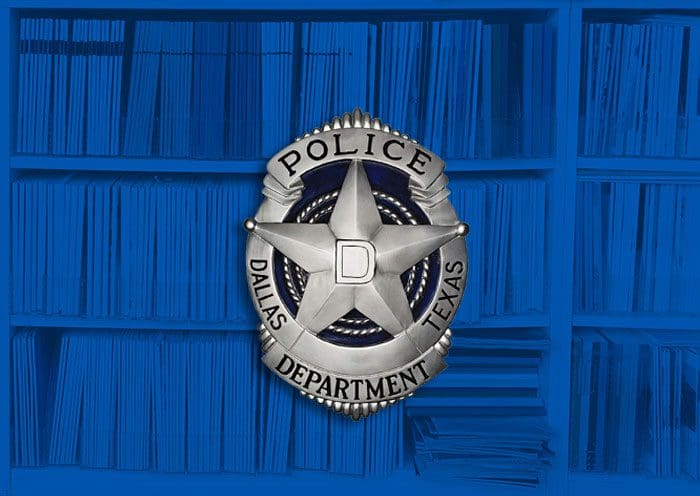A Dallas City Council member revealed that out of the thousands of members of the Dallas Police Department, only four are known to have credibility issues. This important metric raises questions over whether Dallas police have the serious issues the extreme-left claims, as well as questions regarding why the county’s Democrat district attorney appealed to Attorney General Ken Paxton to keep this information hidden.
“There are 4 DPD officers that the [district attorney] will not call to testify (Giglio files). I have been told none of them are in public-facing roles,” Dallas Councilwoman Cara Mendelsohn told Texas Scorecard.
Ever since the tragic death of George Floyd in Minnesota, the extreme-left in America have used the incident as a rallying cry for police departments to be defunded and eliminated, claiming the actions of then-Minnesota police officer Derek Chauvin as true of all police officers.
After riots came to Dallas, Dallas County Judge Clay Jenkins invited the far-left Dallas Police Oversight Coalition to submit a list of demands. Their list was mostly about spending more taxpayer dollars and had little to do with police accountability and transparency.
One proposal, however, would make a difference: removing officers who “have had sustained incidents of untruthfulness, criminal convictions, candor issues, or some other type of issue placing their credibility into question.” Prosecutors may add such officers to what are called Brady or Giglio lists, and district attorneys will not call officers on these lists to testify in court.
“From a public integrity standpoint, people with Giglio files should not be police officers,” said Derek Cohen, director of Texas Public Policy Foundation’s criminal justice reform campaign Right On Crime.
Mendelsohn’s statement shows that out of the over 3,000 members of the Dallas Police Department, only four—barely one-tenth of a percent of the force—have such credibility issues.
When asked for a response to Mendelsohn’s statement, Dallas County Democrat District Attorney John Creuzot did not say Mendelsohn was incorrect. He replied in part, “Sorry, but I do not understand your question, and it may not be your fault. The ‘Brady list’ is sometimes confusing because the reasons for an officer or other person being on the list [are] broader than what the Brady opinion would require.”
Does this mean the four officers Mendelsohn mentioned may be on Creuzot’s Brady list for reasons outside the definition listed above?
We asked Creuzot for his definition of a Brady list and the metrics he uses when determining if an officer will be added to his list. No response was received by publication time.
Mendelsohn’s statement and Creuzot’s response raise questions about whether the Dallas police are as bad as the extreme-left claim, and if Dallas’ Democrat district attorney, John Creuzot, is maintaining accurate Brady or Giglio lists.
Texas Scorecard previously sent an open records request to Creuzot, but his office appealed to Texas Attorney General Ken Paxton to hide this information.
Texas Scorecard also sent inquiries to every member of the Dallas City Council. Mendelsohn was the only member who responded.
The extreme-left coalition has not discussed Brady lists much since submitting their demands. One of their key allies on the Dallas City Council, Adam Bazaldua, said on June 5 that he would ask Creuzot how many Dallas police officers are on such a list. He claimed to have “regular dialogue” with the district attorney.
Since then, we have yet to see an answer from Bazaldua on this question, and he hasn’t replied to further inquiries.
Why would Creuzot’s office fight hard to hide the fact that only four of more than 3,000 members of the Dallas Police Department are on his Brady list? Why would Bazaldua not publicly announce this information?
Bazaldua has been one of four council members leading the effort to defund the police, joined by Councilmembers Lee Kleinman, Adam Medrano, and Omar Narvaez. However, they have not been publicly pushing to remove these four officers from the force.
If there is evidence of severe corruption in the Dallas Police Department, wouldn’t now be the time for Creuzot and members of the Dallas City Council to come forward with their evidence? And if there is a problem, what measures will they take to enact real police accountability and transparency while fulfilling their core service of maintaining law and order?
Concerned voters may contact the Dallas City Council and Mayor Eric Johnson.
Lee Kleinman: sophia.figueroa@dallascityhall.com; 214-670-7817
Adam Medrano: adam.medrano@dallascityhall.com; 214-670-4048
Tennell Atkins: maria.salazar2@dallascityhall.com; 214-670-4066
Adam Bazaldua: Yesenia.Valdez@dallascityhall.com; 214-670-4689
David Blewett: david.blewett@dallascityhall.com; 214-670-5415
Adam McGough: adam.mcgough@dallascityhall.com; 214-670-4068
Chad West: Chad.West@dallascityhall.com; 214-670-0776
Casey Thomas: richard.soto@dallascityhall.com; 214-670-0777
Carolyn King Arnold: District4@DallasCityHall.com; 214-670-0781
Jaime Resendez: jaime.resendez@dallascityhall.com; 214-670-4052
Tennell Atkins: maria.salazar2@dallascityhall.com; 214-670-4066
Paula Blackmon: District9@DallasCityHall.com; 214-670-4069
Adam McGough: adam.mcgough@dallascityhall.com; 214-670-4068
Cara Mendelsohn: cara.mendelsohn@dallascityhall.com; 214-670-4067
David Blewett: david.blewett@dallascityhall.com; 214-670-5415
Jennifer Gates: jennifer.gates@dallascityhall.com; 214-670-7057





